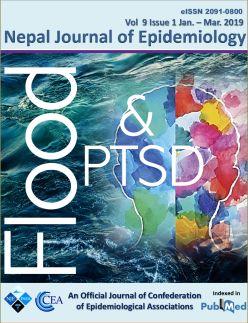Post-Traumatic Stress Disorder among the Flood Affected Population in Indian Subcontinent
DOI:
https://doi.org/10.3126/nje.v9i1.24003Keywords:
mental health illness, post-traumatic stress disorder, India, floodAbstract
Globally, frequent flooding causes higher magnitude of disaster among the developing and developed nations. Particularly, the Indian subcontinent is considered as highly vulnerable area for natural disaster and is affected most because of limited resources and coping strategies for post-disaster rehabilitation. Apart from the great impact on human health, floods have considerable impact on mental health. The most frequently diagnosed psychological illness in flood affected population is post-traumatic stress disorder (PTSD). In India, the incidence of PTSD in major natural disasters varies considerably depending upon the magnitude of event, with the highest rates reported of around 70%. Studies conducted during initial few months post-disaster, showed a higher occurrence of psychiatric manifestations. On the other hand, some reports suggested contrary results under similar circumstances. Notably, extreme age (children and elderly), female gender, socioeconomic status, pre-existing mental health issues and financial crisis post-disaster are the potential predisposing factors influencing the vulnerability of PTSD. In Indian context, the variability in the magnitude of psychiatric illness is mainly attributed to the ethnic diversity (vulnerable population), severity and type of flood event and social support. Still there is more to explore regarding the long-term sequelae of catastrophic floods on physical and mental trauma on disaster-affected populations.
Downloads
Downloads
Published
How to Cite
Issue
Section
License
- Upon acceptance Copyright on any research article is transferred in full to the Confederation of Epidemiological Associations (CEA) and International Nepal Epidemiological Association (INEA). The copyright transfer includes the right to reproduce and distribute the article in any form of reproduction (printing, electronic media or any other form).
- Articles in the Nepal Journal of Epidemiology are Open Access articles published under the Creative Commons CC BY License (https://creativecommons.org/licenses/by/4.0/)
- This license permits use, distribution and reproduction in any medium, provided the original work is properly cited.




